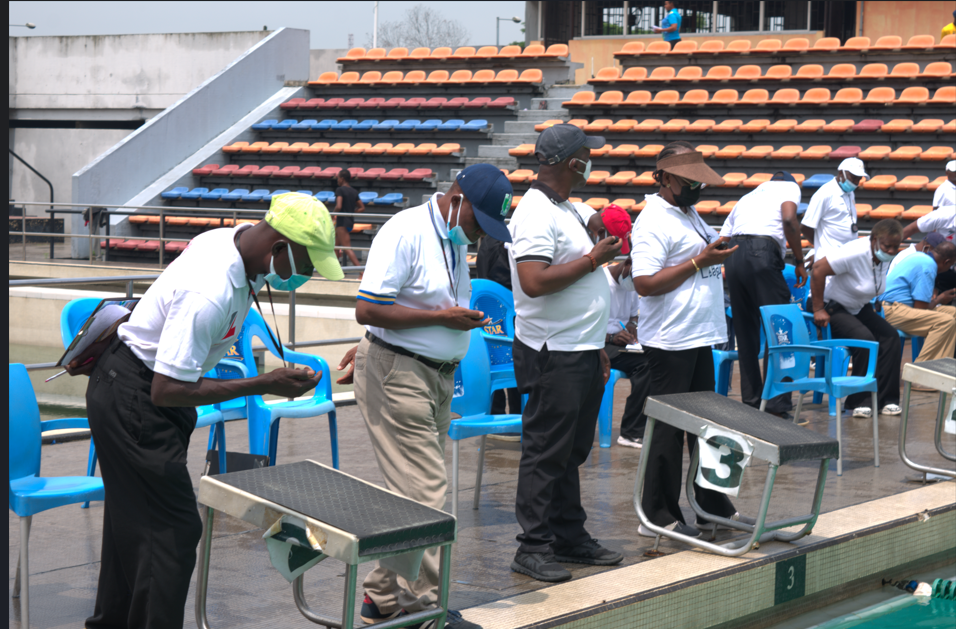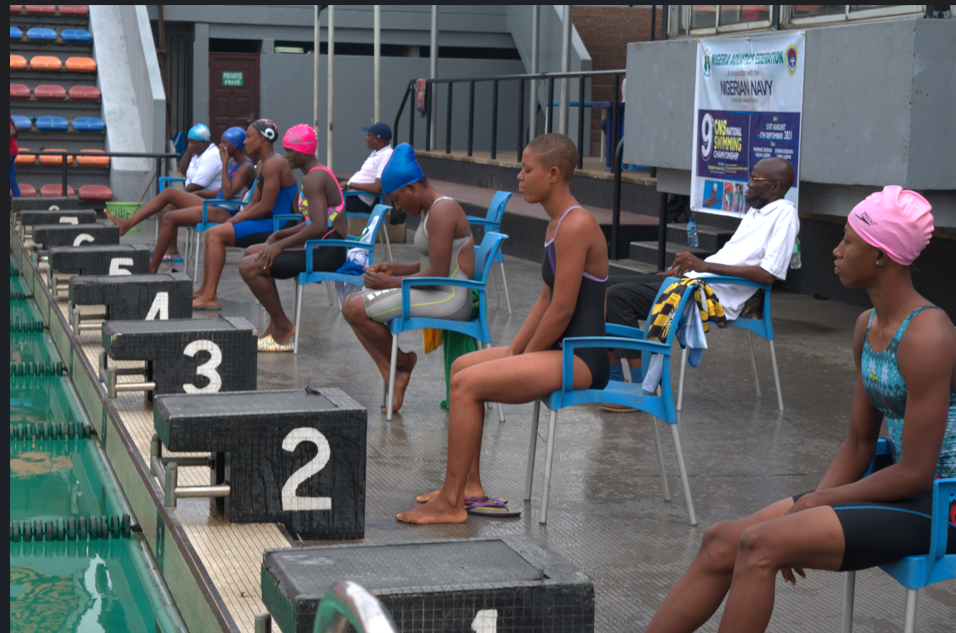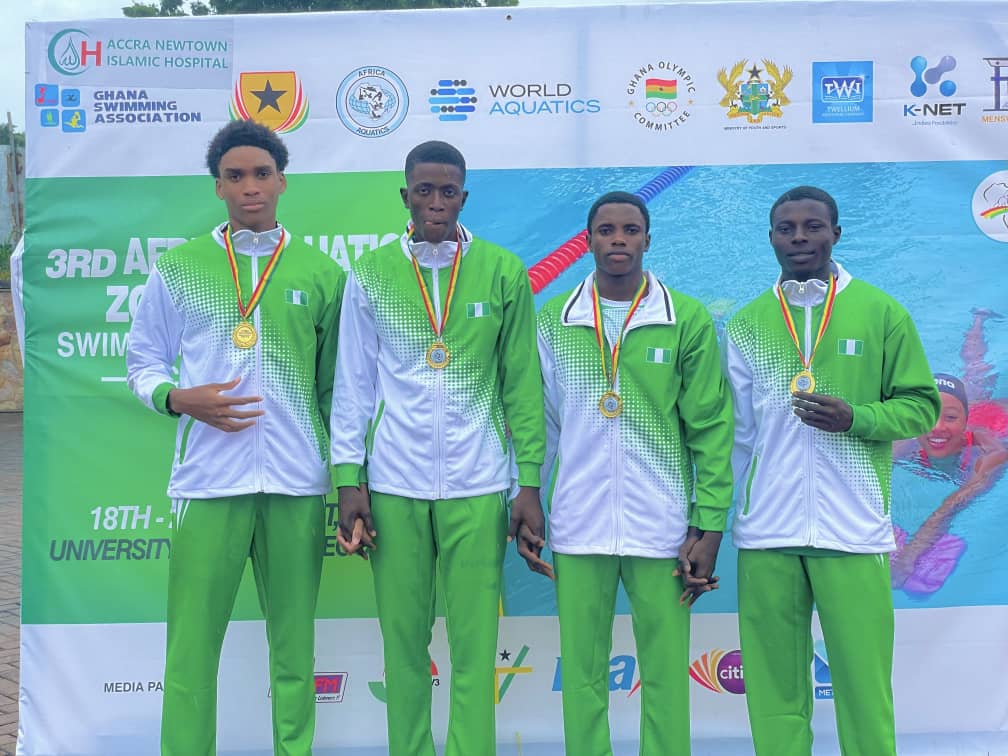Welcome to a world of water...
Introduction
The Nigeria Aquatics Federation is the sports organising body governing the aquatic disciplines of Swimming, Open Water Swimming, Water Polo, Diving, Artistic Swimming, High Diving & Masters and their activities in Nigeria.
The Federation has, since it was established in 1958, been affiliated to the International Swimming Federation (FINA), founded in 1908, and to the Nigeria Olympic Committee (NOC) which was formed in 1949, and initially named the Nigeria Olympic and British Empire & Commonwealth Games Association (NOBECGA). In 1970, when the African Swimming Confederation (CANA) was founded, Nigeria was one of the founding members.
FINA recently (January 2023) officially changed it’s name to World Aquatics (AQUA), and CANA subsequently also changed it’s own name to Africa Aquatics (AA) in March 2023.
State Aquatics / Swimming Associations & the FCT Abuja Association, which all have the responsibility of promoting, encouraging and supporting the development of the various aquatic disciplines within their geographical areas, are all affiliates of the Nigeria Aquatics Federation. Also affiliated to the Federation are Swimming Associations / Clubs in various Federal Military & Paramilitary organisations, several other Federal Agencies, as well as in Federal & Private Universities and Polytechnics.
The Federation’s Headquarters was initially in Lagos, in offices provided by the National Sports Council. In 1973 it was, however, moved to the Swimming complex within the newly built National Stadium, Surulere which hosted the 2nd All Africa Games in January that year. It was again moved to the new National Stadium Swimming Complex in Abuja FCT (later renamed M.K.O International Stadium) when Nigeria hosted the 8th All Africa Games in October 2003.
(b) Association / Federation name changes
Initially bearing the name “Amateur Swimming Association of Nigeria”, that name was changed in 1997 to “Nigeria Swimming Federation” in line with international changes in nomenclature at that time. That name was again changed in January 2013 to the current name “Nigeria Aquatics Federation”, to reflect the Federation’s decision to focus on two other aquatics disciplines (Open Water Swimming & Water Polo) in addition to Swimming.
(c) The early years
Traditional swimming has been in existence in riverine communities all over Nigeria even before Nigeria became the Country that it is today. People living in various fishing communities learnt how to swim for survival purposes to avoid drowning whenever they went out in their boats to fish. Swimming activities were also often a part of various traditional /cultural festivals held annually in many parts of the Country.
According to the records, the first known modern Competitive Swimming event in a swimming pool took place in Lagos in 1928 at the commissioning of the King George V swimming pool, Onikan, Lagos Island. That pool (33.3 yards in length) was built in the early 1920’s by the late Dr John Kehinde Randle, a Medical Doctor, to provide a safe place for the young children of Lagos Island to swim, because of the frequent incidents of drowning in the Lagos lagoon & nearby beaches.
Among the prominent citizens who championed the development and organization of the sport of Swimming in those early days in Lagos were Dr Nnamdi Azikiwe, Dr J. K. Randle, Kofi Duncan, Dr Omololu, and Dr M. O. Alakija.
In 1958, the first National Swimming Association – the Amateur Swimming Association of Nigeria (ASAN) – was formed with Mr E. J. Moses (a senior Education Officer at King’s College, Lagos) as the foundation Chairman.
That same year, Nigeria which was still a British Colony at the time, sent a team of two swimmers (Job Ofongo & Horace Kantu) to represent the Colony at the 6th British Empire & Commonwealth Games in Cardiff, Wales.
The need to improve on the techniques and to develop competitive swimming in the Country led to the employment in 1963 of the first full – time professional Swimming Coach for Nigeria, under a bilateral agreement between the National Sports Council (which was inaugurated in 1962) and the British Council. The arrival of this Coach (Mr Ralph A. B. Watts), who was based at the King George V pool, Onikan, Lagos Island, but who also coached at the Police Barracks swimming pool, Obalende, helped in the further development of the sport through the introduction of modern training methods for swimmers in Lagos Island and it’s environs. Two Nigerians (Mr Godfrey Offurum, who was a Physical Training Instructor with the Nigerian Army, and later Mr Daniel Emoghene) assisted Mr Watts with his training programmes. Mr Emoghene was eventually employed by the National Sports Council as Assistant National Coach in 1967.
The King George V pool which had already been established as the main swimming training centre was where the first set of swimmers to represent Nigeria were based. Job Ofongo & Horace Kantu both trained there, as did other swimmers in various Swimming Clubs (Eja – Nla, Nigerian Army, Leventis, King’s College, etc). Notable among this early group were Modupe Enigbokan, Joseph Afekafe, Stephen Onyeacholam, Mbe Membere, Fred Mann, Babatunde Fatayi – Williams, Funke Adebawo & Funke Zedomi. The motivator and promoter of this swimming development programme, which pre – dated the arrival of Mr Ralph Watts, was Dr Mobolaji Alakija who was also the founder of the Eja – Nla Swimming Club. Many of these swimmers later represented Nigeria internationally.
Meanwhile, at a pool built by the Nigeria Police Force at the Obalende Police Barracks, there was another swimming programme spearheaded by Police Commissioner LeClair. It was initially designed to improve the fitness level & swimming ability of the Officers & men of his Lagos Command, but he then added a developmental swimming programme for the children of the Police Officers & men. This developmental programme produced another set of outstanding swimmers – Christopher & Roland Adingupu, Paul Okwuma, three Ebito’s (Bassey, John & Samuel), Paul Edordu & Sunday Olorife, to mention a few – most of whom went on to represent Nigeria.
In the mid 1960’s, Mr Watts introduced Water Polo (another aquatics discipline) at the King George V pool, Onikan. Consequently, in 1967, National Swimming & Water Polo teams travelled to Conakry, Guinea to participate in our first ever International Friendly Competition.
On 26 November 1970, the African Swimming Confederation (CANA) was founded in Cairo, Egypt. Nigeria was one of the ten (10) founding Nations, others being Algeria, Egypt, Guinea, Kenya, Libya, Niger, Sudan, Tunisia & Zambia. Mr John Adim Elueze of NGR was elected into the first Bureau of CANA, for the period 1970 – 1974.
(d) History of Competitive Swimming in Nigeria
Dr J. K. Randle Swimming Competitions, first started in 1928, were held regularly at the King George V swimming pool, Onikan for several decades, sponsored after Dr Randle’s death via an endowment in his will. Due to the closure of the Onikan pool for repairs in the 1970’s, the Competition was moved to the Rowe Park swimming pool, Yaba. In 1988, the Competition was once again revived at the Onikan swimming pool by Bashorun Jaiye Kofolaran Randle (Dr John Kehinde Randle’s grandson), with the vigorous support of the Lagos State Swimming Association, chaired at that time by Mr Babatunde Fatayi – Williams. In 1989 it was held there again, and in 1990 the Competition had become so big that it was moved to a more spacious venue – the National Stadium swimming pool, Surulere – where it was held annually (except for 1994 & 1995) as an Invitational Competition with swimmers from other States participating until 1999, when that pool was closed down for major repairs. In 2008, another edition was held at the Lagos State owned Teslim Balogun Stadium swimming pool, Surulere, and it was held there again in 2009, with swimmers from several other States, as well as some neighbouring Countries (Benin Ghana & Niger), participating in both Junior & Senior Categories.
During the 1960’s & 1970’s, competitive swimming spread to other cities in the coastal areas of the former Western & Mid – Western Regions of the Country. Because of the two Olympic (50 metre) sized swimming pools – located at the Airport Hotel, Ikeja (built in the early 1960’s) & the National Stadium, Surulere (built in 1972) – most of the Swimming Competitions were initially held in Lagos. During the 1970’s, however, when more Olympic sized pools were built at the Ogbe Stadium Benin City, the Liberty Stadium Ibadan, and the Calabar Stadium Calabar, they also started hosting Swimming Competitions.
With the introduction by the National Sports Commission of the biennial National Sports Festival (NSF) into the Country’s Sports Calendar in 1973, taking place every two years, Competitive Swimming spread quickly to many other States of the Federation. The Mid – West (later renamed Bendel & subsequently Delta & Edo State) and Lagos State were initially dominant, but other States (especially Ondo, Rivers & Oyo States) soon emerged as regular strong contenders. The National Sports Festival has continued to feature prominently and regularly, hosted by various States, although it has not always held every two years. (see Appendix II attached) The 21st NSF was hosted by Delta State in December 2022, at the Stephen Keshi International Stadium pool Asaba, and the 22nd Edition is scheduled to be hosted by Ogun State in 2024.
From the mid – 1970’s up till the early 1990’s, apart from the biennial National Sports Festivals, the development of swimming was greatly assisted by the holding of three Competitions regularly for many years, viz
• the All Nigeria Open Swimming Championships, sponsored for many years by the Ibru Organization held between 1969 – 1990 (many editions)
• the All Nigeria Age Group Swimming Championship, sponsored for many years by Phillips Oil, held annually between 1975 – 1990 (16 editions)
• the Dr Olu Asekun Inter – State Senior Swimming Championship, sponsored by Chief M. K. O. Abiola’s Radio Communications Nigeria, held every year between 1984 – 1992 (9 editions).
Other National Competitions held during that period were ….
• Inter – State Senior Independence Swimming Championship, Ibadan – 1985 & 1986
• Champion of Champions Swimming Competition Lagos – 1985
• NICON All Nigeria Age Group Swimming Competition, Lagos – 1988
• Dr J. K. Randle National Swimming Competitions, Lagos – 1992 & 1993
• Vice President’s National Age Group Swimming Championship, Lagos – 1991 – 1993 (3 editions)
• Shell Open (Senior) Swimming Championship, Port-Harcourt – 1992 & 1993
The development of Water Polo in Nigeria was also made possible through the annual NCR Inter Club Water Polo Tournament sponsored by NCR (Nigeria) Plc and hosted by Ikoyi Club (1938) Lagos. Fourteen (14) Clubs from nine (9) States participated in this Tournament.
• Inter Club Water Polo Tournament held between 1984 – 1990 (7 editions)
From the mid – 1990’s & during the 2000’s, the following major National Competitions were held for several years ….
• the Rivers State Governor’s Cup Competition, Port-Harcourt – 1998, 2002 – 2004 (4 editions)
• the CNS (Chief of the Naval Staff) National Swimming Championship (2000, 2010 – 2014, 2016, 2019, 2021 & 2022 (10 editions, held in various cities).
• National Age Group Swimming Competitions – 2002 & 2009
• Dr J. K. Randle National Swimming Championships, Lagos – 1996 – 1999, 2008 & 2009 (6 editions)
• National Swimming Classics – 2010 (2 events, Lagos & Ibadan)
• NDDC States Secondary Schools Championship, Port-Harcourt – 2011
• Lagos International Swimming Classics – 2013
In order to assist various National Sports Federations in their “Catch them Young”Programs & to help with the selection of Athlets to represent NGR in the African Youth Games, Commonwealth Youth Games & the Youth Olympics, the Federal Ministry of Youth & Sports Development introduced the National Youth Game into the Country’s Sports Calender in 2015. The initial edition was held in Abuja, but subsequent annual editions were hosted by the University of Ilorin, with most sporting events taking place on the University Campus. Six (6) editions have already been held with the 6th edition held in 2021, having missed 2020 because of Covid 19, & also 2022 due to the prolonged ASUU Strike which affected the University of Ilorin.
(e) Participation in International Competitions
Over the years, many Nigerian swimmers have represented the Country in numerous International Competitions, both at Junior & Senior levels:
Junior Competitions ….
• African Youth Games
• FINA World Junior Swimming Championships
• International Swimming Festivals, Neheim – Husten, Arnsberg, Germany
• CANA African Age Group /Junior Swimming Championships
• CANA Africa Zone 2 (West & Central Africa) Junior Swimming Championships
Senior Competitions ….
• Olympic Games
• British Empire / Commonwealth Games
• All Africa / African Games
• Afro-Asian Games
• West African Games
• FINA World Aquatics Championships
• FINA World Swimming Championships (25m)
• CANA African Swimming Championships
• CANA Africa Zone 2 (West & Central Africa) Swimming Championships
• International Friendly Swimming Competitions
o Nigeria /Guinea International Swimming Competition, Conakry, 1967
o Nigeria / Cote d’Ivoire International Swimming Competitions, Lagos & Abidjan, 1972
o Cote d’Ivoire / Ghana / Nigeria Swimming Competitions, Lagos, 1973
o Nigeria /Ghana Swimming Competition, Lagos 1974 & Accra /Kumasi 1975
(f) FINA Awards
The following former Association Chairmen & Federation Presidents have been given awards by FINA for their contributions to the development of aquatics in Nigeria, Africa & the World in general:
FINA Gold Pin:
• Dr D. Olu Asekun
• Chief Olatokunbo Thomas
FINA Silver Pin:
• Dr R. Akin Elegbe
• Mr Babatunde Fatayi – Williams
Both FINA Gold Pin recipients served on the FINA Bureau for many years-
Dr Asekun (Bureau member 1976 – 1988, Vice President 1988 – 2000) and Chief Thomas (Bureau member 2000 – 2013).


